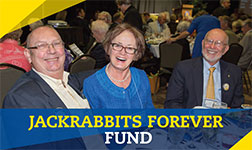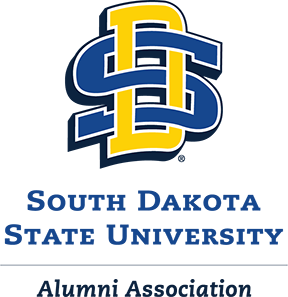This spring saw members of the first Wokini Scholars cohort graduate from South Dakota State University. The program has grown dramatically since starting in the fall 2018 semester, rising from 15 to 50 in the 2021-22 cohort.
Both Luann Miner and Derek Brandis participated in the 2022 commencement exercises in May. Miner graduates with a bachelor’s degree while Brandis graduates with a doctorate as the Wokini Scholars program is available to both undergraduate and graduate students.
Wokini kept undergrad coming back
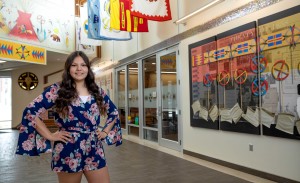 There have been several factors that have kept Luann Miner motivated to pursue her bachelor’s degree in human development and family studies.
There have been several factors that have kept Luann Miner motivated to pursue her bachelor’s degree in human development and family studies.
One, she wanted to be the first person in her family to graduate from college. Another would be being part of the first Wokini Scholars cohort and another would be the SDSU Rugby Club.
“I would have to say it started as a Wokini Scholar,” said Miner. “It allowed me to be comfortable with who I am and then allowed me to be more social, you know, not so shy. I try to keep that in the back of my mind to step out of my comfort zone to interact with others.”
Stepping out of that comfort zone is what got her to play rugby.
While walking through the University Student Union with her roommate and another friend, someone told Miner she’d be a great fit for the club. She’s been more than just a good fit as she was chosen for an all-star game in Houston, not bad for someone who knew nothing about the sport.
She is a hook, which places her in the middle of the scrum. That forward position has been called the hardest position in the sport as it takes strength, courage
and power but also a cool head.
That accurately describes Miner, who spent 16 years in foster care before being adopted by Saisha Sandoz in Redfield. Miner was a freshman at State at the time.
“I was definitely impacted by my last-ever foster mom, who legally adopted me and took me out of 16 years of foster care. Until then, I never knew where I was supposed to be going,” Miner said. “She kept pushing me forward. Before that, I’d be placed with a family for a month or two and then back in the foster care system. It’s hard to know what stability was when you’re constantly moving and people keep telling you to trust the process.”
Trust in others has come from being a Wokini Scholar and by rooming all four years with Kelsey Anderson, a friend of hers from Redfield.
“I chose SDSU as a safe outlet to stay around friends. I didn’t know what college was about because I’m the first one of my family to go to college,” Miner said. “Being a Wokini Scholar has provided four years of being around a majority of the same people and being able to go to an open office or open arms after any conflict or bad day. It’s been very encouraging.
“It’s also brought me back to my own culture and traditions,” she continued. “Being in foster care, I didn’t have the opportunities to learn about my culture, traditions or the history of ancestors. Being a Wokini Scholar has helped shape who I am and what I want to do.”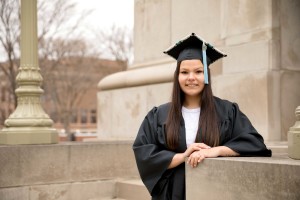
And after interning as a residential counselor with New Beginnings Center in Aberdeen, she would like to work in child protective services before earning a master’s and possibly a doctorate and working as an investigative social worker.
Those career plans have not come easy for the president of the American Indian Student Association.
“I have not wanted to come back to college since first semester my freshman year and then every semester after. I’ve kept coming back, basically from my parents pushing me and not letting me give up,” Miner said. “Part of the inspiration of wanting to continue is being part of the first cohort of the Wokini Scholars to graduate and be able to show no matter how hard it is, push through and finish with a bachelor’s degree.
“I think having the consistent support and encouragement behind me from faculty, advisers and peers just reminded me that going to college as a foster care child is possible, and I want to be able to help others see that light, too, particularly if they are going through a rough patch in life,” she continued.
Another way Miner has shown others how to succeed is participating in the U.S.A. Ambassador Pageant. A two-time selection, she will compete for a title in late July.
“My first time competing at nationals was my first time flying, my first time having a state title, my first time going to Florida … I thought I was done but when this year’s state pageant got closer, I decided I wanted to go for the Miss South Dakota title; I signed up and won so I’m going to Florida for a second time and ready to compete for a national title.”
Not a bad way to end her undergraduate days, particularly for someone who was worried about making a fool of herself by even applying to be a Wokini Scholar.
“The main message that I want anyone, but particularly any child of any age, to know is that their life doesn’t stop because they’re in foster care. Foster care doesn’t define who they are,” she said. “There’s a lot of stereotypes and stuff about foster children but they can still go on to be better and have a better life for themselves, even if they don’t have that support of immediate family behind them. There’s always going to be some support system that you’ll find out there in the world.
“I’d then tell them I didn’t know who I was when I came to college. I was just trying to fit in with everything and everybody, which is next to impossible,” Miner continued. “Being a Wokini Scholar helped a lot. I’d say it all started from orientation in 2018. It’s made me more comfortable as a person and where I come from.”
Wokini gave grad student direction
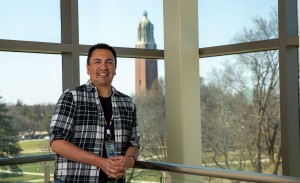 Derek Brandis’ academic career follows more the path of the Missouri River than Interstate 90. His path from an incoming SDSU freshman to earning his bachelor’s degree in 2009, a master’s degree in 2013 and a doctorate in 2022 has been a long, winding one with a few dam-like blocks.
Derek Brandis’ academic career follows more the path of the Missouri River than Interstate 90. His path from an incoming SDSU freshman to earning his bachelor’s degree in 2009, a master’s degree in 2013 and a doctorate in 2022 has been a long, winding one with a few dam-like blocks.
“Don’t feel like you have to rush or compare yourself to others or feel intimidated that you’re not as far along as others because your path could lead to something you really enjoy that you wouldn’t have experienced if you did rush yourself and try to get done right away,” he said about his route to the doctorate.
Brandis admitted he did not know what to major in when he arrived at SDSU after graduating from Winner High School.
“As an undergrad, I took some math and science classes. I was a math major at one point and then switched to pharmacy and then to chemistry,” he said. “When I finally graduated, I was trying to figure out if I wanted to go into pharmacy again or try graduate school.
“One of the lab coordinators that I knew pretty well in the chemistry department, Dr. (Ron) Hirko, mentioned I should apply to graduate school,” Brandis continued. “I looked at it as an opportunity that, if I got in, I could decide between pharmacy or grad school. But when I started grad school, it was more or less I still didn’t know … I was just not sure what I wanted to do.”
Change of plans
At the time, Brandis liked the aspect of teaching and chose the chemistry education route. This required getting a master’s degree in one subfield of chemistry, which he completed in 2013. He then began pursuit of his doctorate. However, that soon changed when he accepted a full-time job.
While working, Brandis decided he wanted something different from doing similar routines each day.
Change of plans, II
With that mindset, Brandis decided to eliminate the nagging feeling that he should have finished his doctorate. He talked with Doug Raynie M.S. ’83, who leads the Department of Chemistry and Biochemistry, and his advisers, professors Matt Miller and Jihong Cole-Dai, about it. Brandis was readmitted to the graduate school and returned to complete his doctorate.
“It’s one of those things where it wasn’t fluid and constantly changing, but there were parts that I wasn’t sure about what I was doing so I stopped at one point,” Brandis said. “I got a little more focused in the last couple of years and knew I wanted to teach and to do research.”
Unfortunately, family matters slowed the path to the doctorate but Brandis was able to persevere thanks to support from friends and the chemistry department.
Wokini Scholar
On the Ph.D. path, he applied to be a Wokini Scholar, a program that was not available during his first degrees.“I also wanted to be able to help out other Native students that may be interested in STEM, to show how they can go through this process that they maybe see as difficult,” Brandis said.
Being part of the first Wokini Scholar cohort has helped him in ways beyond the financial support.
“It’s really kind of neat to be in that first cohort and be part of this really supportive group that’s graduating and serving as role models for other students,” Brandis said, adding there are numerous activities available for students at the American Indian Student Center. “The AISC is a place to study, hang out or just hang with people who had similar experiences that you had growing up. The community is one of the best things about it.”
Dissertation work, defense
Brandis will wrap up the final work on his doctorate this summer.
“It took me so long to get to this point. It was not a straight, narrow path, but it’s one of those deals where, if I hadn’t gone through all of that, I wouldn’t be where I am today. I wouldn’t have figured out my path to my Ph.D.,” he said.
“While I didn’t know what I was doing at times, it’s one of those things where I enjoyed the path I was on. I had a bunch of people support me on the way and while it took a little bit longer than I expected, I wouldn’t have changed it one bit.”
–Matt Schmidt



